Fleurs du Mal Magazine


Or see the index
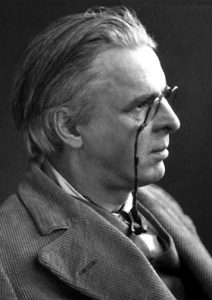
‘Easter 1916’.
Too long a sacrifice
Can make a stone of the heart.
O when may it suffice?
That is Heaven’s part, our part
To murmur name upon name,
As a mother names her child
When sleep at last has come
On limbs that had run wild.
What is it but nightfall?
No, no, not night but death;
Was it needless death after all?
W.B. Yeats
(1865—1939)
‘Easter 1916’
• fleursdumal.nl magazine
More in: *War Poetry Archive, Archive Y-Z, Archive Y-Z, Yeats, William Butler

Song of the Old Mother
I rise in the dawn, and I kneel and blow
Till the seed of the fire flicker and glow;
And then I must scrub and bake and sweep
Till stars are beginning to blink and peep;
And the young lie long and dream in their bed
Of the matching of ribbons for bosom and head,
And their day goes over in idleness,
And they sigh if the wind but lift a tress:
While I must work because I am old,
And the seed of the fire gets feeble and cold.
W.B. Yeats
(1865—1939)
Song of the Old Mother
• fleursdumal.nl magazine
More in: Archive Y-Z, Archive Y-Z, Yeats, William Butler

When you are old and grey
When you are old and grey and full of sleep,
And nodding by the fire, take down this book,
And slowly read, and dream of the soft look
Your eyes had once, and of their shadows deep;
How many loved your moments of glad grace,
And loved your beauty with love false or true,
But one man loved the pilgrim soul in you,
And loved the sorrows of your changing face;
And bending down beside the glowing bars,
Murmur, a little sadly, how Love fled
And paced upon the mountains overhead
And hid his face amid a crowd of stars.
W.B. Yeats
(1865—1939)
When you are old and grey
• fleursdumal.nl magazine
More in: Archive Y-Z, Archive Y-Z, Yeats, William Butler
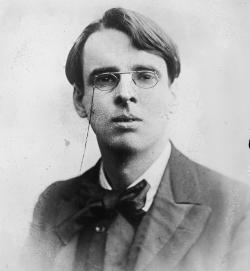
Never give all the Heart
Never give all the heart, for love
Will hardly seem worth thinking of
To passionate women if it seem
Certain, and they never dream
That it fades out from kiss to kiss;
For everything that’s lovely is
But a brief, dreamy, kind delight.
O never give the heart outright,
For they, for all smooth lips can say,
Have given their hearts up to the play.
And who could play it well enough
If deaf and dumb and blind with love?
He that made this knows all the cost,
For he gave all his heart and lost.
William Butler Yeats
(1865-1939)
Never give all the Heart
• fleursdumal.nl magazine
More in: Archive Y-Z, Archive Y-Z, Yeats, William Butler

An Irish Airman foresees his Death
I know that I shall meet my fate
Somewhere among the clouds above;
Those that I fight I do not hate,
Those that I guard I do not love;
My country is Kiltartan Cross,
My countrymen Kiltartan’s poor,
No likely end could bring them loss
Or leave them happier than before.
Nor law, nor duty bade me fight,
Nor public men, nor cheering crowds,
A lonely impulse of delight
Drove to this tumult in the clouds;
I balanced all, brought all to mind,
The years to come seemed waste of breath,
A waste of breath the years behind
In balance with this life, this death.
William Butler Yeats
(1865-1939)
An Irish Airman foresees his Death
Photo: Alice Boughton, 1903
• fleursdumal.nl magazine
More in: Archive Y-Z, Archive Y-Z, Yeats, William Butler

The Lake Isle of Innisfree
I will arise and go now, and go to Innisfree,
And a small cabin build there, of clay and wattles made;
Nine bean-rows will I have there, a hive for the honey-bee,
And live alone in the bee-loud glade.
And I shall have some peace there, for peace comes dropping slow,
Dropping from the veils of the morning to where the cricket sings;
There midnight’s all a glimmer, and noon a purple glow,
And evening full of the linnet’s wings.
I will arise and go now, for always night and day
I hear lake water lapping with low sounds by the shore;
While I stand on the roadway, or on the pavements grey,
I hear it in the deep heart’s core.
William Butler Yeats
(1865-1939)
The Lake Isle of Innisfree
Photo: Alice Boughton, 1903
• fleursdumal.nl magazine
More in: Archive Y-Z, Archive Y-Z, Yeats, William Butler
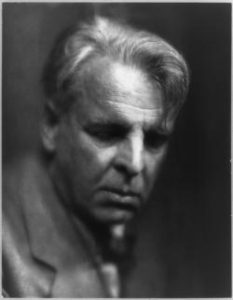
A Drinking Song
Wine comes in at the mouth
And love comes in at the eye;
That’s all we shall know for truth
Before we grow old and die.
I lift the glass to my mouth,
I look at you, and I sigh.
William Butler Yeats
(1865-1939)
A Drinking Song
• fleursdumal.nl magazine
More in: Archive Y-Z, Archive Y-Z, Yeats, William Butler
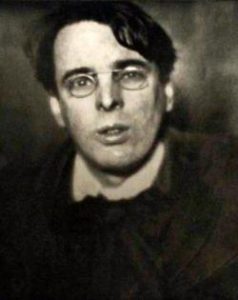
Peace
Ah, that Time could touch a form
That could show what Homer’s age
Bred to be a hero’s wage.
‘Were not all her life but storm,
Would not painters paint a form
Of such noble lines,’ I said,
‘Such a delicate high head,
All that sternness amid charm,
All that sweetness amid strength?’
Ah, but peace that comes at length,
Came when Time had touched her form.
William Butler Yeats
(1865-1939)
Peace
• fleursdumal.nl magazine
More in: Archive Y-Z, Archive Y-Z, Yeats, William Butler

Friends
Now must I these three praise –
Three women that have wrought
What joy is in my days:
One because no thought,
Nor those unpassing cares,
No, not in these fifteen
Many-times-troubled years,
Could ever come between
Mind and delighted mind;
And one because her hand
Had strength that could unbind
What none can understand,
What none can have and thrive,
Youth’s dreamy load, till she
So changed me that I live
Labouring in ecstasy.
And what of her that took
All till my youth was gone
With scarce a pitying look?
How could I praise that one?
When day begins to break
I count my good and bad,
Being wakeful for her sake,
Remembering what she had,
What eagle look still shows,
While up from my heart’s root
So great a sweetness flows
I shake from head to foot.
William Butler Yeats
(1865-1939)
Friends
• fleursdumal.nl magazine
More in: Archive Y-Z, Archive Y-Z, Yeats, William Butler
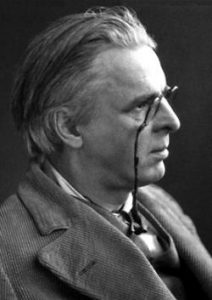
The Ragged Wood
O hurry where by water among the trees
The delicate-stepping stag and his lady sigh,
When they have but looked upon their images –
Would none had ever loved but you and I!
Or have you heard that sliding silver-shoed
Pale silver-proud queen-woman of the sky,
When the sun looked out of his golden hood? –
O that none ever loved but you and I!
O hurry to the ragged wood, for there
I will drive all those lovers out and cry –
O my share of the world, O yellow hair!
No one has ever loved but you and I.
William Butler Yeats
(1865-1939)
The Ragged Wood
• fleursdumal.nl magazine
More in: Archive Y-Z, Archive Y-Z, Yeats, William Butler

On a Political Prisoner
She that but little patience knew,
From childhood on, had now so much
A grey gull lost its fear and flew
Down to her cell and there alit,
And there endured her fingers’ touch
And from her fingers ate its bit.
Did she in touching that lone wing
Recall the years before her mind
Became a bitter, an abstract thing,
Her thought some popular enmity:
Blind and leader of the blind
Drinking the foul ditch where they lie?
When long ago I saw her ride
Under Ben Bulben to the meet,
The beauty of her country-side
With all youth’s lonely wildness stirred,
She seemed to have grown clean and sweet
Like any rock-bred, sea-borne bird:
Sea-borne, or balanced in the air
When first it sprang out of the nest
Upon some lofty rock to stare
Upon the cloudy canopy,
While under its storm-beaten breast
Cried out the hollows of the sea.
William Butler Yeats
(1865-1939)
On a Political Prisoner
Photo: Alice Boughton, 1903
•fleursdumal.nl magazine
More in: Archive Y-Z, Archive Y-Z, Yeats, William Butler

A Memory of Youth
The moments passed as at a play;
I had the wisdom love brings forth;
I had my share of mother-wit,
And yet for all that I could say,
And though I had her praise for it,
A cloud blown from the cut-throat north
Suddenly hid Love’s moon away.
Believing every word I said,
I praised her body and her mind
Till pride had made her eyes grow bright,
And pleasure made her cheeks grow red,
And vanity her footfall light,
Yet we, for all that praise, could find
Nothing but darkness overhead.
We sat as silent as a stone,
We knew, though she’d not said a word,
That even the best of love must die,
And had been savagely undone
Were it not that Love upon the cry
Of a most ridiculous little bird
Tore from the clouds his marvellous moon.
William Butler Yeats
(1865-1939)
A Memory of Youth
• fleursdumal.nl magazine
More in: Archive Y-Z, Archive Y-Z, Yeats, William Butler
Thank you for reading Fleurs du Mal - magazine for art & literature